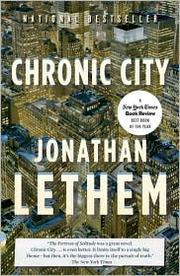Second reading
4 stars
1) "I first met Perkus Tooth in an office. Not an office where he worked, though I was confused about this at the time. (Which is itself hardly an uncommon situation, for me.)"
2) "Haven't you wondered why the average consumer is uncomfortable with letterboxed movies? It isn't because most people are programmed to be Philistines, though they are. Cable channels go on offering scan-and-pan versions to keep people from having to consider that frame's edge, which reminds them of all they're not seeing. That glimpse is intolerable. When your gaze slips beyond the edge of a book of magazine, you notice the ostensible texture of everyday reality, the table beneath the magazine, say, or the knee of your pants. When your eye slips past the limit of the letterboxed screen, you're faced with what's framed and projected in that margin—it ought to be something, but instead it's nothing …
1) "I first met Perkus Tooth in an office. Not an office where he worked, though I was confused about this at the time. (Which is itself hardly an uncommon situation, for me.)"
2) "Haven't you wondered why the average consumer is uncomfortable with letterboxed movies? It isn't because most people are programmed to be Philistines, though they are. Cable channels go on offering scan-and-pan versions to keep people from having to consider that frame's edge, which reminds them of all they're not seeing. That glimpse is intolerable. When your gaze slips beyond the edge of a book of magazine, you notice the ostensible texture of everyday reality, the table beneath the magazine, say, or the knee of your pants. When your eye slips past the limit of the letterboxed screen, you're faced with what's framed and projected in that margin—it ought to be something, but instead it's nothing, a terrifying murk, a zone of nullity. But the real reason it's so terrifying is because it begs the question of whether they're the same thing. Maybe the tabletop or the knee of your pants bears no more relation to the contents of the magazine than the images on the screen do to the void above and below."
3) "I find I want to get this description right, or at least a little righter. With the possible exception of my own face in the bathroom mirror, the church spire outside my window is the sole thing I look at deliberately, consciously, every single day. Yet I glance in its direction as if in doubt, as though the spire's memory is only a rumor between me and myself, and one of the two of us doesn't completely trust the other. When my eyes do confirm the church's actuality (buildings do persist, Manhattan does exist, things are relentlessly what they seem even if they serve as hosts, as homes, for other phenomena), the sight acts on my mind like an eraser rubbing away the words that might describe it, into crumbs easily swept from the page. If I'm elsewhere, I have an easy name for the thing: a church spire, a few blocks away, and, sporadically, a flock of wheeling birds. When I look, however, language dies."
4) "First we had to eat what now appeared, tongues of eggplant and bell pepper rolled into a juicy little vortex or eye at the center of a plate spattered with pesto, and then depart the table in the flurry as these dishes were cleared, following Russ Grinspoon, who'd ever-so-suavely placed his fishy hand on the bare shoulder of his rapt listener and asked her to excuse him, explaining that he'd promised to show me and Perkus a certain rare vase in Arnheim's collection. Out we went, incredibly, easily, through the maze of tables and up the mighty staircase, afraid to touch a polished banister too wide for mortal hands, on steps so plushed by carpet that our footfalls felt ungravitied, so that we might have been ghosts, or snowflakes, riding an updraft instead of settling to earth where we belonged. In a dim, swank study at the top of the stairs, walls lined with leather-bound sets, storm-giddy windows overlooking the top of the greenhouse roof and, within it, the dinner party we'd vacated, Grinspoon sparked a ready joint."
5) "Perkus lived as much inside a conundrum as he did a city. At any given moments the conundrum presented itself in some outward form, a vessel or symbol. Chase Insteadman might be the thing that had come along to replace chaldrons, which had themselves probably replaced some other emissary pregnant with undisclosed messages—Gnuppets, say, or Marlon Brando, Perkus couldn't always say which was the preeminent form conundrum took at a given time."
6) "'Something happened, Chase, there was some rupture in this city. Since then, time's been fragmented. Might have to do with the gray fog, that or some other disaster. Whatever the cause, ever since we've been living in a place that's a replica of itself, a fragile simulacrum, full of gaps and glitches. A theme park, really! Meant to halt time's encroachment. Of course such a thing is destined always to fail, time has a way of getting its bills paid. So these disjunctions appear, and we have to explain them away, as tigers or epic sculpture. If Noteless didn't exist the city would have had to invent him, Chase!' The more Perkus fleshed this theory the more the holes in his speech began to seem a kind of necessary reply to the temporal lacunae he felt the city had fallen into, as well as to Laird Noteless's bottomless pits and absent structures."

